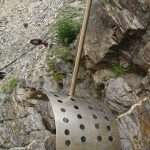Jews and Freemasons are the targets of the prejudices of those who people the pages of Umberto Eco’s novel ‘The Prague Cemetery’. Anti-Semitism had been fostered by church teaching in the Middle Ages and had led to the expulsion of Jews from a series of European countries. In 19th Century France, even a century after the Revolution, the hatred continued; in some it was a matter of visceral prejudice, for others it was a more calculating piece of scapegoating. In Eco’s novel, Rachovsky, an agent of the Russian secret service, declares:
‘For the enemy to be recognised and feared, he has to be in your home, or on your doorstep. Hence the Jews. Divine Providence has given them to us and so, by God, let us use them and pray there’s always some Jew to fear and hate. We need an enemy to give people hope. Someone said that patriotism is the last refuge of cowards: those without moral principles usually wrap a flag around themselves, and the bastards always talk about the purity of the race. National identity is the last bastion of the dispossessed. But the meaning of identity is now based on hatred, on hatred for those who are not the same. Hatred has to be cultivated as a civic passion. The enemy is the friend of the people. You always want someone to hate in order to feel justified in your own misery. Hatred is the primordial passion. It is love that’s abnormal. That is why Christ was killed: he spoke against nature. You don’t love someone for your whole life – that impossible hope is the source of adultery, matricide, betrayal of friends . . . But you can hate someone for your whole life – provided he’s there to keep your hatred alive. Hatred warms the heart”. The Prague Cemetery, pp 333-4
How much do we need a perceived ‘enemy’ for the cohesion of our own group? Ireland has never had a large Jewish population; anti-Semitism has only ever existed in small pockets. Personal inadequacies, whether amongst leaders or ordinary people, have found their expression through hatred of Catholics, of Protestants, of the British, of Travellers. But the traditional targets have been mostly removed from the radar screen, partly through legislation, partly through social pressures.
Who now are the scapegoats? Listening to a man who never worked, even in the boom times, complaining about the Polish workers, was evidence enough that the human need to scapegoat is as strong as ever. The new scapegoat list includes African refugees, Eastern Europeans, Moslems, almost anyone foreign.
In the church, prejudice cannot be admitted, it assumes the guise of theological conviction, so, out of love for them, gay and lesbian people are subject to condemnation. A commenter on this blog wrote in May, ‘God hates homosexuality’. If God is purported to hate it, then what is the logical response? Isn’t the fact that there were pink triangles in the concentration camps a logical consequence of the demonisation of people?
Umberto Eco writes about a prejudice that was unique, there has been no prejudice akin to ant-Semitism in its virulence or its violence, but Rachovsky’s words are a reminder of how easy it is in difficult times to provide a scapegoat to a population angry with its lot and angry with itself.
